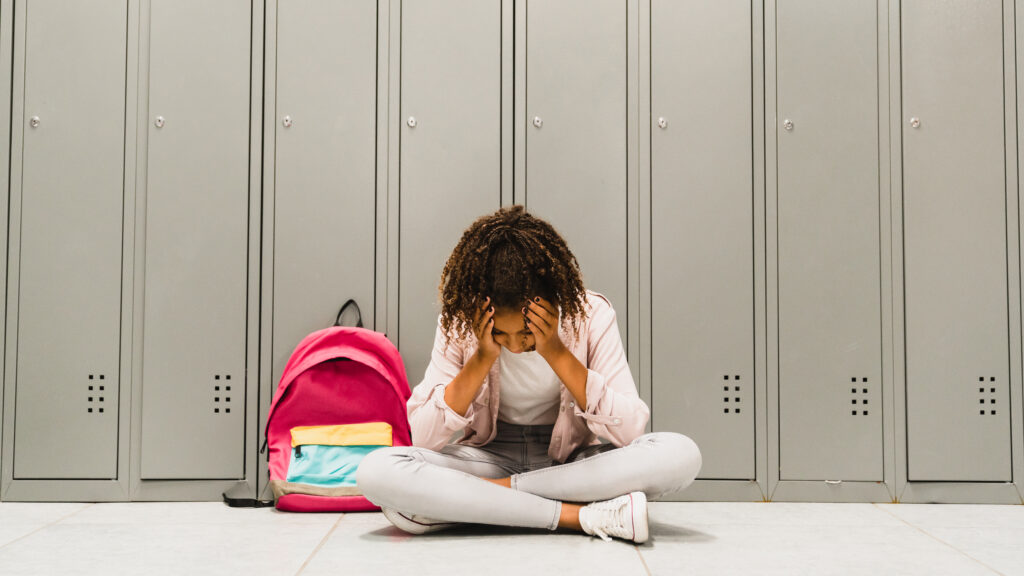The start of a new school year often brings a mix of emotions, from excitement to see friends and start new classes to anxiety about the unknown challenges ahead. For many students, the transition from summer break to the start of the new school year can cause feelings of anxiety and apprehension. We call it “back-to-school anxiety.” Let’s examine this seasonal anxiety and learn how students can effectively cope for a successful school year.
Understanding Back-to-School Anxiety and Its Causes
Back-to-school anxiety occurs when students are preparing to return to school after a break, such as summer vacation or even a long weekend. It can manifest as feelings of nervousness, dread, or even panic about going back to school. This anxiety can be caused by various factors, such as fear of the unknown, pressure to perform well academically, or social anxiety about interacting with peers and teachers. Let’s dive into these causes a bit deeper:
Past Experiences
Previous negative experiences, such as bullying or academic struggles, can cause anxiety about returning to school. Students may worry that these experiences will repeat, leading to increased stress and anxiety.
Fear of the Unknown
Uncertainty about what the new school year will bring, such as new teachers, classmates, or subjects, can be a significant source of anxiety for students. The fear of the unknown can be overwhelming, causing sleepless nights and constant worry.
Peer Pressure and Social Anxiety
The pressure to fit in and be accepted by classmates can lead to social anxiety. Worrying about making new friends, fitting in with a group, or being judged by others can cause significant stress and anxiety.
Recognizing the Symptoms of Back-to-School Anxiety
Back-to-school anxiety can have a significant impact on a student’s ability to learn and excel academically. Anxiety can cause difficulties with concentration, memory, and decision-making, all of which are essential for successful learning. Additionally, anxiety can lead to physical, emotional, and behavioral symptoms
Physical Symptoms
Additionally, anxiety can lead to physical symptoms such as headaches, stomachaches, and fatigue, which can further hinder a student’s ability to focus and learn. It is crucial to recognize these symptoms of back-to-school anxiety to address them effectively.
Emotional Symptoms
Emotional symptoms may include feelings of sadness, irritability, or excessive worry. Students may also experience a lack of motivation or enthusiasm about returning to school.
Behavioral Symptoms
Behavioral symptoms may include withdrawal from friends and family, changes in eating and sleeping patterns, or a reluctance to go to school. It is crucial to recognize and address these symptoms early to prevent them from escalating.

10 Strategies to Manage Back-to-School Anxiety
It is essential to address back-to-school anxiety to ensure a successful and enjoyable school year. Here are some strategies that can help manage back-to-school anxiety:
- Mindfulness and Relaxation Techniques: Practicing mindfulness and relaxation techniques, such as deep breathing, meditation, and progressive muscle relaxation, can help reduce feelings of anxiety and stress.
- Developing a Positive Mindset: Focusing on positive thoughts and affirmations can help shift your mindset and reduce anxiety. Try to focus on the exciting aspects of going back to school, such as seeing friends, learning new things, and participating in extracurricular activities.
- Establishing a Support System: Having a support system of friends, family, and teachers can provide a sense of security and help reduce feelings of anxiety.
- Creating a Comfortable Learning Environment: Making your learning environment as comfortable and organized as possible can help reduce anxiety and prevent you from feeling overwhelmed.
- Engaging in Physical Activity: Regular physical activity is essential for reducing anxiety and improving overall mental health.
- Effective Time Management: Managing your time effectively can help reduce overwhelming feelings and anxiety. Make a to-do list, prioritize tasks, and take breaks when needed.
- Setting Realistic Goals: Setting realistic and achievable goals for the school year can help reduce stress and provide a sense of accomplishment.
- Fostering a Growth Mindset: Developing a growth mindset, which is the belief that abilities and intelligence can be developed through hard work and effort, can help reduce anxiety and improve confidence.
- Embracing Change: Accepting that change is a natural part of life and approaching it with a positive attitude can help reduce feelings of anxiety and apprehension.
- Seeking Professional Help: If back-to-school anxiety is causing significant distress or interfering with daily functioning, it may be helpful to seek professional help from a therapist or counselor; more on that later.
How Parents and Teachers Can Help
If you have a child or student who is experiencing back-to-school anxiety, it is essential to be supportive and understanding. Here are some ways to help:
Support and Understanding
Providing support and understanding is crucial for helping students manage their anxiety. Parents and teachers should acknowledge the student’s feelings and encourage open communication.
Creating a Supportive Environment
Creating a supportive environment, both at home and in the classroom, can help reduce anxiety. This includes providing a comfortable and organized space for the student to work and study.
Encouraging Open Communication
Encouraging open communication is essential for addressing and managing anxiety. Parents and teachers should encourage students to express their feelings and concerns openly.
When to Seek Professional Help
If a student’s anxiety is affecting their daily functioning or causing significant distress, it may be necessary to seek professional help. Finding the right professional is especially important in = effectively managing anxiety. This may include a therapist, counselor, or a healthcare professional who specializes in anxiety disorders.

Treat Back-to-School Anxiety At Bright Harbor Healthcare
Back-to-school anxiety is a widespread issue for many students. Nonetheless, with the right strategies and support, it can be effectively managed. Bright Harbor Healthcare is dedicated to providing the necessary support for students, parents, and teachers to recognize the signs of anxiety and take proactive steps to address it. We offer comprehensive support services and programs for students to help them overcome their anxiety and have a successful and enjoyable school year. Together, we can create a brighter future for our students and children by addressing and managing back-to-school anxiety. Learn more by reaching out to Bright Harbor Healthcare today.

